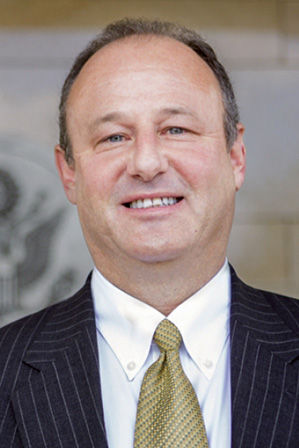The Time for Diplomacy Is Now
President’s Views
BY ERIC RUBIN

As I write this column, the heroic citizens, soldiers and leaders of Ukraine continue to hold the line against an unceasing onslaught from Russia. Secretaries Blinken and Austin have just visited Kyiv after a secret 12-hour train ride from the Polish border. Entire cities lie in ruins. Millions of people have been displaced. One member of U.S. Embassy Kyiv’s local staff has tragically been killed in combat.
A new U.S. ambassador has finally been named to replace Masha Yovanovitch in Kyiv, nearly three years after her forced departure. In Bridget A. Brink, we are fortunate that President Biden has chosen a talented, experienced pro for this exceedingly difficult job, which should not have been left vacant for so long—as so many of our other ambassadorial posts and other key positions have been.
Filling the ambassadorship in Kyiv is important for both practical and symbolic reasons. Our country and our Service are faced with a fundamental challenge from a rogue, hostile, unpredictable Russia that remains the world’s largest country, with the world’s largest nuclear weapons stockpile, and is one of the world’s major producers of oil, gas and other natural resources. There will be time to debate what went wrong and what, if anything, we could have done differently that might have prevented this state of affairs. This is not the time for that.
This is the time for equipping the Foreign Service to fully engage. We cannot keep trying to do more with less. We cannot keep a diplomatic presence in nearly every country without the staffing and funding to support it, and we can’t claim or reclaim a major leadership role unless we are prepared to pay for it and work for it—and to fill all of our senior leadership positions promptly. We can’t continue to ask FS and LE staff and their families to step up, only to then bog them down with myopic bureaucratic contortions.
The “peace dividend” following the end of the Cold War may or may not have been a chimera; but in any event, it is now history. Faced with Russia’s invasion of Ukraine and China’s continuing challenge to us and our allies around the globe, we don’t have the luxury of debating the case for increased U.S. engagement. Nor can we continue to value military engagement over diplomatic engagement in so many circumstances.
That’s where the Foreign Service comes in. The U.S. Foreign Service is the first line of defense for U.S. security, prosperity and fundamental values. The United States must support the hard work of diplomacy and development that can prevent conflict, death and suffering.
To those colleagues who may have wondered in recent years what exactly we are working for and why our role as America’s diplomats is still important, I say this: Democracy, human rights, individual freedom and the rule of law are under siege around the world, and U.S. security and economic interests are under threat. We must lead the charge to defend them. We must defend the global rules-based system that our country has played a pivotal role in creating and maintaining since 1945, and that has served the U.S. and the world so well.
Our colleagues across the Foreign Service are ready to take on this challenge, to take necessary risks and accept hardships. They are right to ask for greater resources, increased staffing and a commitment to fundamental reforms that the Service so desperately needs. We can’t take on 2022’s challenges with 1991’s budgets and wishful, triumphalist thinking, nor with antiquated rules and policies that date to the 1970s or earlier.
AFSA will do its part on Capitol Hill, with the administration and with the American people. We are a small organization representing a small (in Washington terms) constituency, so we will continue to partner with like-minded organizations and groups to make the case for the seriousness of this moment and the need to meet its challenges.
This may not be the 2022 we hoped for, but we have to do everything possible to ensure that we head into 2023 with a strong and well-staffed Foreign Service on the ground around the world, particularly in the most challenging and pivotal places.

